5 November 2015 • No. 45
Special edition
Quotes on music & singing
¶ Invocation. “How Can I Keep From Singing?” performed by Enya.
¶ “Sing lustily and with good courage. Beware of singing as if you were half-dead, or half asleep; but lift up your voice with  strength. Be no more afraid of your voice, nor more ashamed of its being heard.” —John Wesley
strength. Be no more afraid of your voice, nor more ashamed of its being heard.” —John Wesley
¶ “If you can walk, you can dance. If you can talk, you can sing.” —Zimbabwean proverb
¶ In Scripture, mountains sing (Isaiah 49:13), fields rejoice (1 Chronicles 16:32), while rivers (Psalm 98:8) and trees (Isaiah 55:12) clap their hands. But dancing? as these Japanese Maple trees (right), located on the grounds of the Japanese Garden in Portland Oregon.
¶ “Music rots when it gets too far from the dance. Poetry atrophies when it gets too far from music.” —Ezra Pound
¶ “The earth has music for those who listen.” —William Shakespeare
¶ “Be like the bird that, pausing in her flight awhile on boughs too slight, feels them give way beneath her, and yet sings, knowing that she hath wings.” —Victor Hugo
¶ “Learning music by reading about it is like making love by mail.” —Luciano Pavarotti
¶ Call to worship. “Open your mouths, oh people of praise. Unchain your lungs and unleash your lips. Let joyful noise erupt from every muted tongue, thankful hymns from every muffled mouth. Whether big band or bluegrass or rhythm and blues. Polka or hip-hop, bebop or swing. Salsa, Gregorian or adagio for strings..” —Continue reading Ken Sehested’s “Big Band or bluegrass,” a litany for worship inspired by Psalm 98
¶ “This will be our reply to violence: to make music more intensely, more beautifully, more devotedly than ever before.” —Leonard Bernstein
¶ “The man that hath no music in himself / Nor is not move'd with concord of sweet sounds, / Is fit for treasons , strategems,  and spoils; / The motions of his spirit are dull as night, / And his affections dark as Erebus: Let no such man be trusted.” —William Shakespeare
and spoils; / The motions of his spirit are dull as night, / And his affections dark as Erebus: Let no such man be trusted.” —William Shakespeare
¶ “As we go marching, marching, in the beauty of the day, / A million darkened kitchens, a thousand mill lofts gray / Are touched with all the radiance that a sudden sun discloses. / For the people hear us singing: bread and roses, bread and roses!” —“Bread and Roses,” labor organizing song inspired by the 1912 textile workers strike in Lawrence, Ma. Watch this 6+ minute video about that strike. Listen to Judy Collins’ rendition of the song.
¶ Prayer of intercession. “Many are the hearts that are weary tonight / Wishing for the war to cease, / Many are the hearts looking for the right / To see the dawn of peace.” —“Tenting Tonight On the Old Campground,” one of the most popular Union camp songs during the Civil War, sung here by the 2nd South Carolina String Band
¶ “May all that has been reduced to noise in you become music again.” —David Teems
¶ Here are a few articles that might be of interest on singing:
•Singing in a choir among the best mechanisms for human bonding. —Shana Lebowitz
•“Choir singing improves health, happiness.” —Jacques Launay and Eiluned Pearce
•“Singing Changes Your Brain” (in a good way). —Stacy Horn
¶ “‘Bring me a musician,’ the Prophet Elisha called. And while the musician played, the power of the Lord came on him.” —2 Kings 3:15
¶ “The one who sings prays twice.” —commonly attributed to St. Augustine
¶ “Sing to the Lord; praise the Lord! For God has delivered the life of the needy from the hands of evildoers.” —Jeremiah 20:13
¶ “Sing a song full of the faith that the dark past has taught us, / Sing a song full of the hope that the present has brought us; / Facing the rising sun of our new day begun, / Let us march on till victory is won.” —James Weldon Johnson, "Lift Every Voice and Sing" performed here by the tightly-harmonic Wardlaw Brothers rendition
¶ Hymn of praise. “Lord, I lift my eyes to the hills, knowing my help is coming from You.” —“Total Praise” written by Richard Smallwood
¶ “You see the power of music in Alzheimer’s patients who can’t tell you the name of their spouse or children but can instantly sing songs they learned as a child.” —Bob Kauflin
¶ “A person who does not regard [music] as a marvelous creation of God, must be a clodhopper indeed and does not  deserve to be called a human being; he should be permitted to hear nothing but the braying of asses and the grunting of hogs.” —Martin Luther
deserve to be called a human being; he should be permitted to hear nothing but the braying of asses and the grunting of hogs.” —Martin Luther
¶ “Let the word of Christ dwell in you richly, teaching and admonishing one another in all wisdom, singing psalms and hymns and spiritual songs with thankfulness in your hearts to God.” —Colossians 3:16
¶ “We are children of the hope and the children of the promise. What a privilege to be a peacemaker and follow in [Jesus’] steps. With the sound of his words ringing in our ears: ‘Be of good cheer, I have overcome the world!’ (John 16-33) What else can we do but sing . . . and roll up our sleeves.’” —Noel Moules
¶ Hymn of confession. “Sometimes I Feel Like a Motherless Child” performed by Paul Robeson.
¶ “all which isn’t singing is mere talking.” —e.e. cummings
¶ “Music is everybody’s possession. It’s only publishers who think that people own it.” —John Lennon
¶ “Lay down your weary tune, lay down, / Lay down the song you strum, / And rest yourself 'neath the strength of strings / No voice can hope to hum.” —Bob Dylan. Listen to Darrell Adams’ rendition on Ken Sehested’s “Journey to Iraq” video (8 minutes)
¶ “When such as I cast out remorse / So great a sweetness flows into the breast / We must laugh and we must sing / We 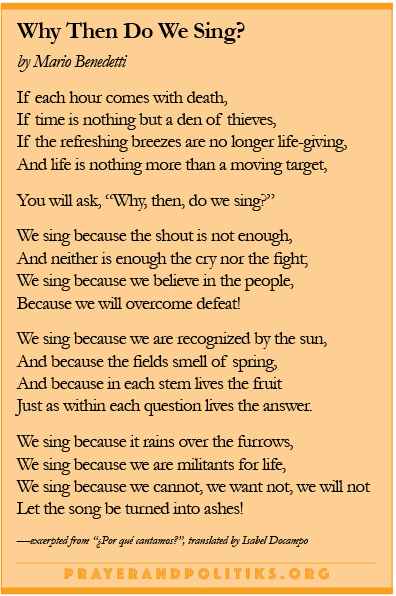 are blest by everything / Everything we look upon is blest.” —William Butler Yeats
are blest by everything / Everything we look upon is blest.” —William Butler Yeats
¶ “Music expresses that which can not be said and on which it is impossible to be silent.” —Victor Hugo
¶ “The surprise came at the end of a banjo lesson. Cary Fridley, my teacher, began describing the work involved in ‘cutting’ her next CD: recruiting musicians, practicing privately, practicing together again and again—all in preparation for the final recording session coming up the next week.
“‘I get increasingly anxious as we approach the recording,’ she admitted.
“‘Well,’ I asked, ‘what helps you with your anxiety?’
“Her response was profound beyond her knowing. ‘When I can get to that place within myself and with others where the music is more important than me, then I am not anxious.’” —Mahan Siler, quoting his banjo teacher
¶ Hymn of assurance. “Whispering hope, oh, how welcome thy voice, / Making my heart in its sorrow rejoice,” performed by Willie Nelson
¶ “To know the dark, go dark. Go without sight, / and find that the dark, too, blooms and sings, / and is traveled by dark feet and dark wings.” —Wendell Berry
¶ “Man shall not live by bread alone, and what the farmer does I must do. I must feed the people—with my songs." —renowned singer, writer and civil rights activist Paul Robeson, who was blacklisted during the McCarthy era
¶ “Birds Singing and Chirping in Slow Motion with Slowed Down Bird Song” video.
¶ “God respects me when I work, but loves me when I sing.” —Rabindranath Tagore
¶ “Music is a moral law. It gives a soul to the universe, wings to the mind, flight to the imagination, a charm to sadness and  a gaiety and life to everything. It is the essence of order and leads to all that is good, true and beautiful, of which it is the invisible but nevertheless dazzling, passionate and eternal form.” —Plato
a gaiety and life to everything. It is the essence of order and leads to all that is good, true and beautiful, of which it is the invisible but nevertheless dazzling, passionate and eternal form.” —Plato
¶ “I keep a bough in my heart that a singing bird may come.” —Chinese proverb
¶ “Do you know that our soul is composed of harmony?” —Leonardo da Vinci
¶ “I think I should have no other mortal wants, if I could always have plenty of music. It seems to infuse strength into my limbs and ideas into my brain. Life seems to go on without effort, when I am filled with music.” —George Eliot
¶ “I live my life in growing orbits / which move out over the things of the world. / Perhaps I can never achieve the last, / but that will be my attempt. / I am circling around God, around the ancient tower, / and I have been circling for a thousand years. / And I still don't know if I am a falcon / or a storm, or a great song.” —Rainer Maria Rilke
¶ “I haven't understood a bar of music in my life, but I've felt it.” —Igor Stravinski
¶ “Please! No more new hymns. What's wrong with the inspiring hymns with which we grew up? When I go to church, it's to  worship God, not to be distracted with learning a new hymn. Last Sunday's was particularly unnerving. While the text was good, the tune was quite unsingable and the harmonies were quite discordant.” —The hymn in question was “What a Friend We Have in Jesus," from an 1890 letter to the editor of the Lutheran Witness.
worship God, not to be distracted with learning a new hymn. Last Sunday's was particularly unnerving. While the text was good, the tune was quite unsingable and the harmonies were quite discordant.” —The hymn in question was “What a Friend We Have in Jesus," from an 1890 letter to the editor of the Lutheran Witness.
¶ Preach it. “And to be bold, to be brave, it is the thinking that the heart can still be saved, And the darkness can come quick, the danger’s in the anger and in the hanging on to it.” —“Nothing More,” by The Alternate Route, performed here by PS22 Chorus, an elementary school in Graniteville, New York.
¶ People in power are seldom willing to “hear any other music but what is known to please them.” —Colonial Baptist pastor Roger Williams
¶ “Singing, poetry, literature . . . are like the water lilies. The flower blossoms on top of the water, but underneath is a long root that goes to the bottom of the pond. What determines how beautiful that water lily is and how strong it is, is the rich mud at the bottom of that pond. To me, what people stand for represents the roots in the mud at the bottom of the lake.” —Zilphia Horton, co-founder with Miles Horton of Highlander Research and Education Center, which throughout its storied history combined cultural arts with training for social justice organizers
¶ “Prayer is more than something I do. The longer I practice prayer, the more I think it is something that is always happening, like a radio wave that carries music through the air where I tune in to it or not.” —Barbara Brown Taylor
¶ Call to the table. The music of Humpback whales. 
¶ “We love to sing, ‘I have decided to follow Jesus,’ but we don't bother looking to see which way he went.” —Frank Stagg
¶ “One violinist can be a master technician who plays a concerto with such flawless technical perfection that the audience is astounded at his dexterity. Another violinist, however, perhaps with less than perfect technical skill, allows the music to be played through her in a way which can transport an audience to experience the music itself rather than simply appreciate a performance. The trust to which Paul calls us is a giving of ourselves to God in a way which allows God to be ‘played’ through our lives in whatever circumstance we encounter.” —M. Robert Mulholland Jr.
¶ “A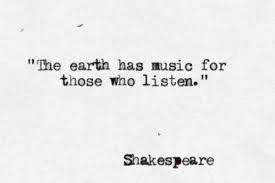 bird doesn't sing because it has an answer, it sings because it has a song.” —Joan Walsh Anglund (and Maya Angelou)
bird doesn't sing because it has an answer, it sings because it has a song.” —Joan Walsh Anglund (and Maya Angelou)
¶ “Each time we sing the Magnificat, we proclaim to each other what sort of God we believe in and especially, as Martin Luther says, how God deals with those of low and high degree. Luther says, we sing it for three reasons: (1) to strengthen our faith, (2) to comfort the lowly, and (3) to terrify the mighty.” —Bonnie Jensen
¶ Considering the text too subversive, in the 1980s the government of Guatemala prohibited the public reading of Mary’s “Magnificat,” her song of praise in Luke 1. Likewise in Chile, under the military dictatorship of Augusto Pinochet.
¶ Altar call. “The Beatitudes,” performed performed by Nóirín Ní Riain at the Glenstall Abbey, Ireland.
 ¶ “The good thing about music, when it hits you, you feel no pain.” —Bob Marley
¶ “The good thing about music, when it hits you, you feel no pain.” —Bob Marley
¶ “Inspiration and craft plus time and effort minus fear and doubt multiplied by purpose equals song.” —Ray Wylie Hubbard, country/folk/blues singer, guitarist, songwriter
¶ “I spent time with the matriarch of Southern Gospel music at Fuller Seminary in February. I was not sure what to expect, but we really hit it off. You will love the quote she had for the students who were all into ‘Praise and Worship’ music: ‘Folks, if all you want is climax without commitment, then you are in the world's oldest profession.’” —personal note from Michael Hawn, director of the Sacred Music Program at Perkins School of Theology
¶ “The question for the singer is not, Do you have a voice? but, Do you have a song?” —Don Hustad
¶ “Say 'NO' to peace if what they mean by ‘peace’ is the quiet misery of hunger, the frozen stillness of fears, the silence of bro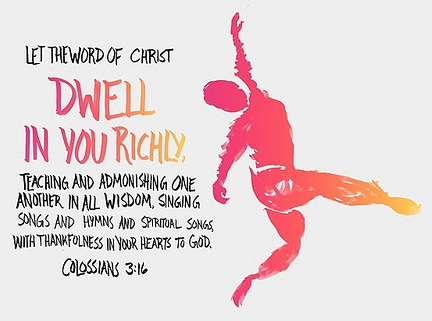 ken spirits, the unborn hopes of the oppressed. Tell them that peace is the shouting of children at play, the babble of tongues set free, the thunder of dancing feet, and a voice singing.” —Brian Wren
ken spirits, the unborn hopes of the oppressed. Tell them that peace is the shouting of children at play, the babble of tongues set free, the thunder of dancing feet, and a voice singing.” —Brian Wren
¶ Closing hymn. “O God of earth and altar, bow down and hear our cry, / Our earthly rulers falter, our people drift and die; / The walls of gold entomb us, the swords of scorn divide; / Take not Thy thunder from us, but take away our pride.” —“O God of Earth and Altar,” lyrics by G.K. Chesterton
¶ “While love is unfashionable / let us live / unfashionably. / Seeing the world / a complex ball / in small hands; / love our blackest garment. / Let us be poor / in all but truth, and courage / handed down / by the old / spirits. / Let us be intimate with / ancestral ghosts / and music / of the undead. / While love is dangerous / let us walk / bareheaded / beside the Great River. / Let us gather blossoms / under fire.” —Alice Walker
¶ Benediction. “If Thou art near when life is closing / All joyful shall I fall asleep, / Be Thou with me as I awaken, / And claim my soul when I arise,” performed by Charlotte Church.
# #
Featured this week on prayer&politiks:
•“Big Band or bluegrass,” a litany for worship inspired by Psalm 98
•“New (and adapted) lyrics for Advent and Christmas hymns”
 ©Ken Sehested @ prayerandpolitiks.org. Language not otherwise indicated above is that of the editor. Don’t let the “copyright” notice keep you from circulating material you find here (and elsewhere in this site). Reprint permission is hereby granted in advance for noncommercial purposes.
©Ken Sehested @ prayerandpolitiks.org. Language not otherwise indicated above is that of the editor. Don’t let the “copyright” notice keep you from circulating material you find here (and elsewhere in this site). Reprint permission is hereby granted in advance for noncommercial purposes.
Your comments are always welcomed. If you have quotes about music and singing to add to the list above, please offer them in the "comments" section below. If you like what you read, pass this along to your friends.



 of sobbing, of the soul’s aching groan. Here the tear is neither uncommon nor unwelcomed. Here the strong confess their doubts, the fluent run out of words.” —Continue reading Ken Sehested’s “
of sobbing, of the soul’s aching groan. Here the tear is neither uncommon nor unwelcomed. Here the strong confess their doubts, the fluent run out of words.” —Continue reading Ken Sehested’s “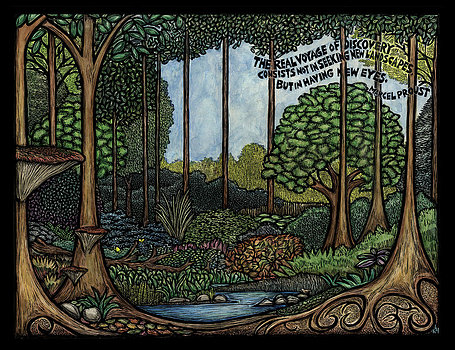 ¶ Great story about a transforming conversation in the midst of the grief of everyday life. —Hannah Greenwald, “
¶ Great story about a transforming conversation in the midst of the grief of everyday life. —Hannah Greenwald, “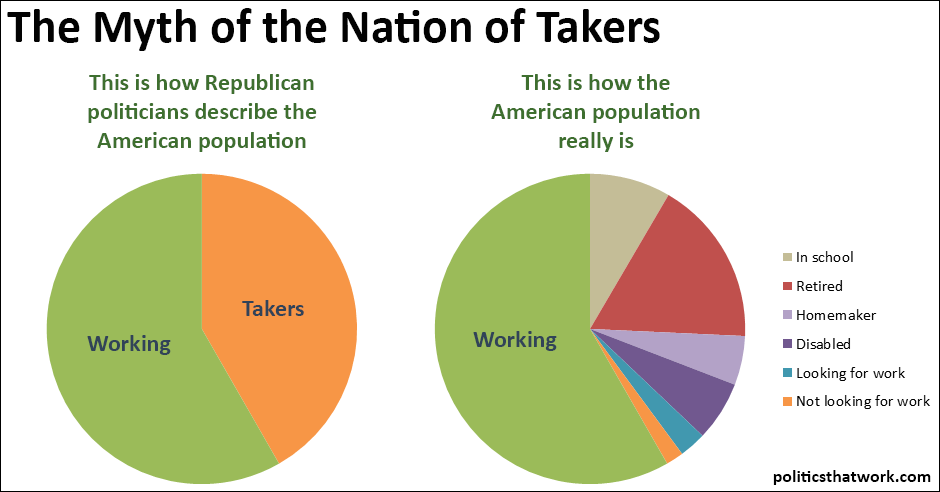 from Credit Suisse’s Global Wealth Report for 2015, released last week. Last year, Credit Suisse found the richest 1 percent of adults owned 48% of global wealth. According to the new report, the top 1 percent now hold 50.4% of all the world’s household wealth.” —
from Credit Suisse’s Global Wealth Report for 2015, released last week. Last year, Credit Suisse found the richest 1 percent of adults owned 48% of global wealth. According to the new report, the top 1 percent now hold 50.4% of all the world’s household wealth.” — patched with plaid fabric, with that head-turning chic meek appeal. (Available through one of those ubiquitous “dear so-and-so or current resident” catalogs.)
patched with plaid fabric, with that head-turning chic meek appeal. (Available through one of those ubiquitous “dear so-and-so or current resident” catalogs.)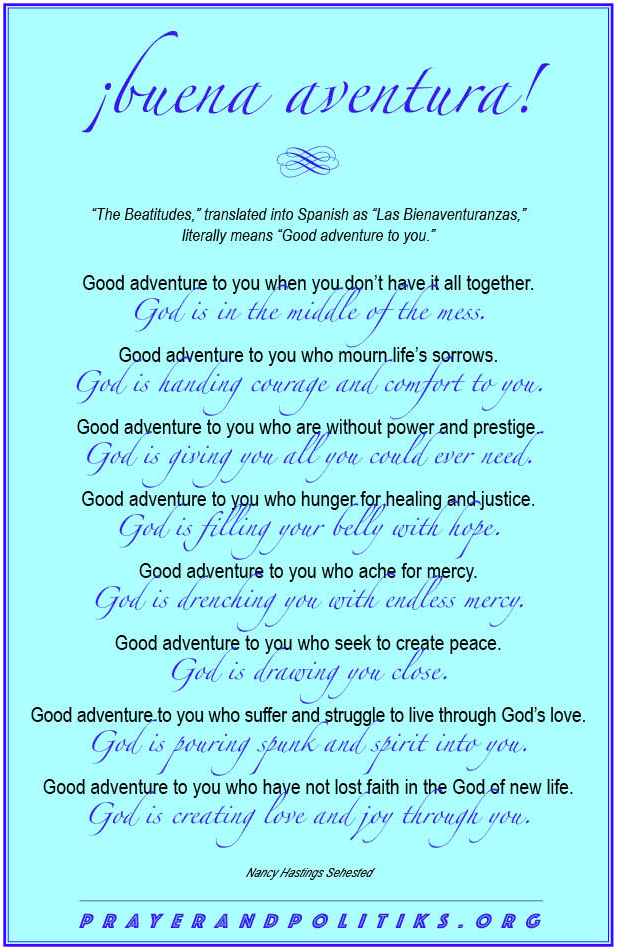 upbeat earnings reports. —
upbeat earnings reports. —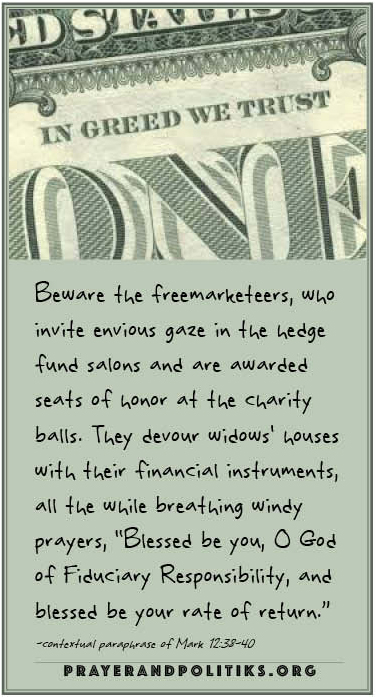 rationale, see the “
rationale, see the “
 refugees. For the pilgrim, there is a choice. For the refugee, there is no choice. For the pilgrim, there is freedom. For the refugee, there is no freedom. The biblical story offers us Ruth, the pilgrim and Naomi, the refugee. Both step into an uncertain future.” —Continue reading Nancy Hastings Sehested’s sermon, “
refugees. For the pilgrim, there is a choice. For the refugee, there is no choice. For the pilgrim, there is freedom. For the refugee, there is no freedom. The biblical story offers us Ruth, the pilgrim and Naomi, the refugee. Both step into an uncertain future.” —Continue reading Nancy Hastings Sehested’s sermon, “ name that means “house of bread,” had become an empty house. Elimelech and Naomi became refugees. They left their homeland of Bethlehem with their two sons. They found a way to survive in the foreign land of Moab.
name that means “house of bread,” had become an empty house. Elimelech and Naomi became refugees. They left their homeland of Bethlehem with their two sons. They found a way to survive in the foreign land of Moab. she liked it or not, Naomi had a companion for the journey.
she liked it or not, Naomi had a companion for the journey. Bible verses in my enemy’s camp and the words would explode with new converts. It didn’t happen. The divide became greater. We both walked away from each other thinking we’d won the argument.
Bible verses in my enemy’s camp and the words would explode with new converts. It didn’t happen. The divide became greater. We both walked away from each other thinking we’d won the argument.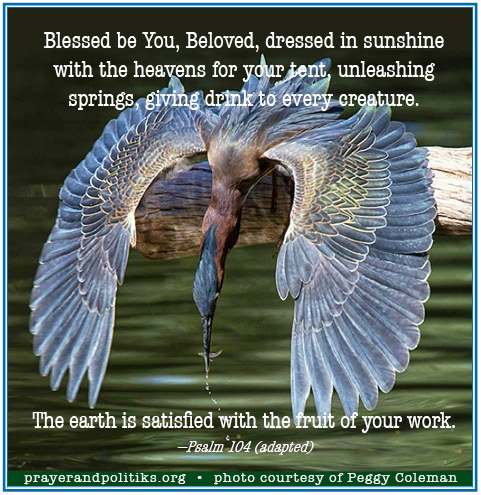 sure to come, no longer checked by the dams of possibility and doubt shored with the black mortar of cynicism.” —continue reading “
sure to come, no longer checked by the dams of possibility and doubt shored with the black mortar of cynicism.” —continue reading “ ¶ Harriet Tubman wins vote to replace Andrew Jackson on $20 bill. “
¶ Harriet Tubman wins vote to replace Andrew Jackson on $20 bill. “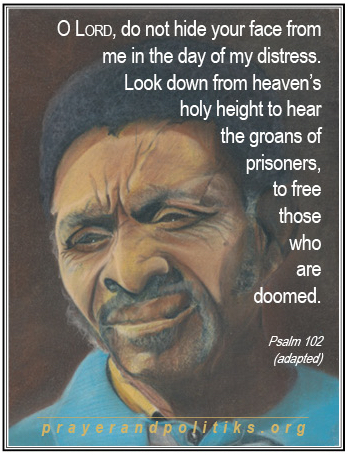 from his “The Three Hermits” opera, lyrics by Michael Dennis Browne, adapted from a Russian Orthodox prayer, sung here by the Minnesota-based ensemble
from his “The Three Hermits” opera, lyrics by Michael Dennis Browne, adapted from a Russian Orthodox prayer, sung here by the Minnesota-based ensemble  punishment. The justices denied the case at least in part because of the execution of the original plaintiff, Alfredo Prieto, who was given a lethal injection October 1 by the state of Virginia before the high court could rule on his final stay application.” —Richard Wolf,
punishment. The justices denied the case at least in part because of the execution of the original plaintiff, Alfredo Prieto, who was given a lethal injection October 1 by the state of Virginia before the high court could rule on his final stay application.” —Richard Wolf,  thought that forced “solitude” would encourage repentance leading to positive social behavior.
thought that forced “solitude” would encourage repentance leading to positive social behavior.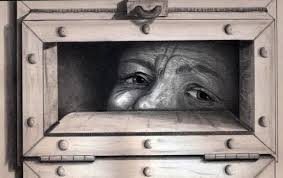 ¶ “Nothing sucks more about prison than missing the people who own beachfront property in your heart.” —“Ghost,” a maximum security prisoner, in a letter to his former chaplain after transferring to another facility
¶ “Nothing sucks more about prison than missing the people who own beachfront property in your heart.” —“Ghost,” a maximum security prisoner, in a letter to his former chaplain after transferring to another facility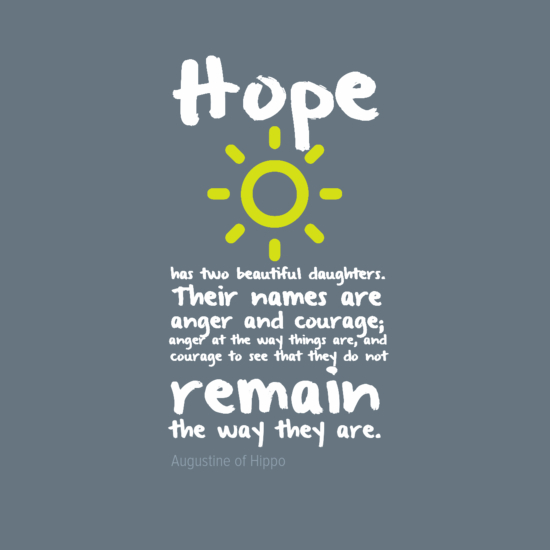 ¶ Call to the table. “Hope has two beautiful daughters. Their names are anger and courage: anger at the way things are and courage to see that they do not remain the way they are.” —St. Augustine
¶ Call to the table. “Hope has two beautiful daughters. Their names are anger and courage: anger at the way things are and courage to see that they do not remain the way they are.” —St. Augustine EXTRA Good news! A note from Gerald, prayer&politiks’ guardian angel and synod convener.
EXTRA Good news! A note from Gerald, prayer&politiks’ guardian angel and synod convener.